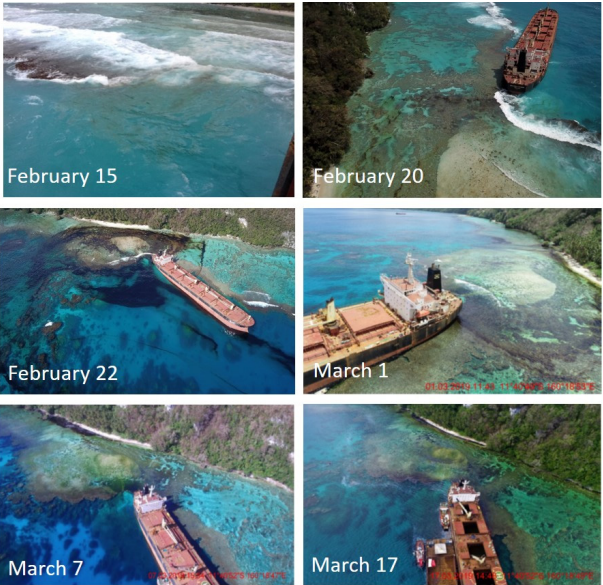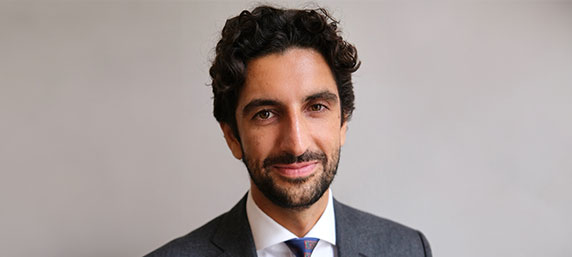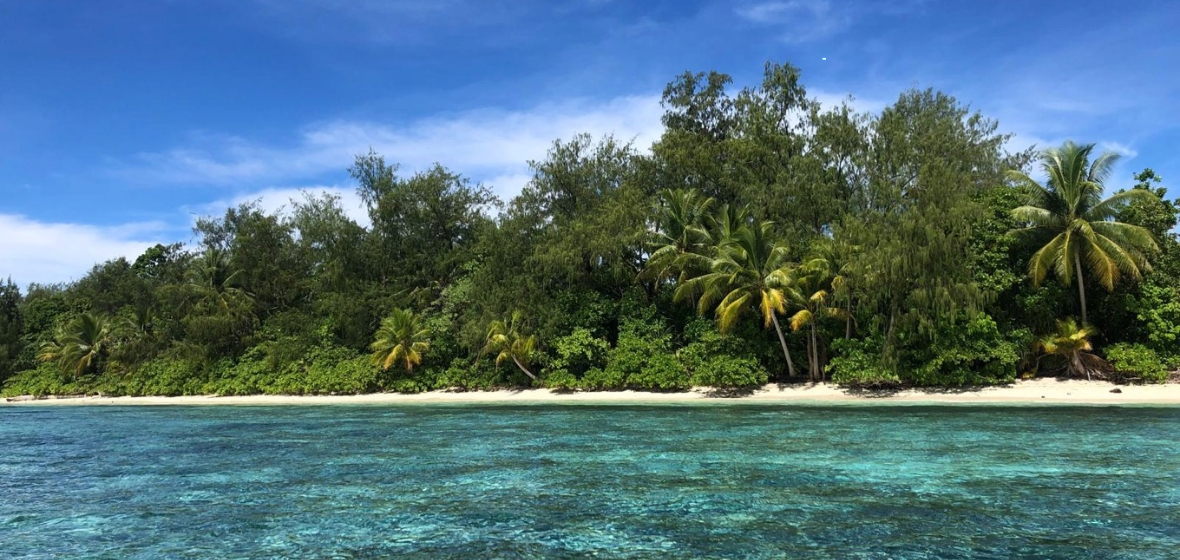A hugely important case for Solomon Islands, and one that will likely attract international attention, was filed on 31 January in the High Court in Honiara. The co-claimants, both landowners and the Solomon Islands Government, are seeking liability and compensation from international companies over one of the worst environmental disasters in the country’s history.
On 5 February 2019, the Hong Kong-flagged MV Solomon Trader, bearing 700 tonnes of oil, came loose from its moorings during cyclone-induced swells. These are common to the Rennell Island region, where cyclones and floods happen routinely. The 225-metre ship, which had been loading bauxite from a nearby mine, ran aground on Kongobainiu reef, releasing a devastating oil spill. Wreaking havoc on marine life, the spill left a thick, oily substance coating the water, and caused a fishing ban that meant the villages of Matanga, Vangu, Lavangu and Kangava were suddenly dependent on food deliveries from the capital of Honiara.
Oil spills are a significant health threat to humans, marine and wildlife, and plants, since oil contains toxic chemicals such as volatile organic compounds (VOCs) and polycyclic aromatic hydrocarbons (PAHs). They are enormously expensive to clean up. The ship owners, bauxite mine company, and insurers are being called upon to defend a claim brought by international lawyers and counsel on behalf of the customary landowners affected by the spill, along with the Government of Solomon Islands, who are seeking environmental and other damages.

Acting for the claimants are Primo Afeau Legal Services (PALS) lawyer William Kadi and international lawyers John Ridgway and Dirk Heinz from the Pacific Legal Network, as well as international counsel Harj Narulla and Frank Clarke (Counsel).
Amongst the defendants are two insurance companies, Dutch-headquartered MS Amlin Marine NV and Korea P&I Club, a South Korean Government associated entity.
The damage has impacted communities for six years
Rennell Island is the largest raised coral atoll in the world, and East Rennell Island is home to a UNESCO World Heritage listed site, Lake Tegano, which is the largest freshwater lake in the Pacific.

Dirk Heinz, a lawyer with the Pacific Legal Network, says, “The damage incurred because of the incidents speaks for itself. Most of the landowners there were not deriving any real benefit from the mining operations. There were well-documented bad mining practices. There were no environmental safeguards in place for any of the mines. The operations were disrupting cultural cohesion, and at worst, there were serious allegations of sex trafficking and abuse. So, there was already a well-established problem before the oil spill happened, and I think the end result is that a catastrophe was inevitable, which is this oil spill.”
Heinz explains that Kangava Bay is mostly a subsistence community.
“They get some imports from the capital or elsewhere in the Solomons. But day to day, most sustenance and enjoyment is linked to the reef: accessing fish and shellfish from the reef, and swimming. There’s a bunch of natural water springs near the shoreline where this incident occurred, which people there have used for as a water source for many hundreds or thousands of years. The islands are around 80 kilometres long. When you have an incident like this, it doesn’t just affect the immediate area. In a small place, the environmental, social, health and cultural effects have a real tendency to mushroom out and affect everyone in the island.”
Mining and logging are friend and foe in the Solomon Islands
Bauxite mining, valued at around $40 million to the Solomon Islands annually, has a troubled relationship with landowners. Along with gold and nickel mining, bauxite mining is one of the key contributors to the nation’s GDP.
According to a 2024 Islands Business feature story, the Mines and Mineral Act 1990 is “weak outdated legislation (and) allows investors to exploit the system, leaving landowners and the environment at a disadvantage.”
This legislation is intended to be replaced, but the Mineral Resources Bill remains before Parliament at this point.
The story suggests “the mining industry in the Solomon Islands is rife with corruption and malpractice. Allegations of bribery and collusion between government officials and mining companies are common.”
Despite an increase in mining licenses, the Finance Minister (and former Prime Minister), Manasseh Sogavare admitted that the government had failed to collect revenue from mining companies owing to tax exemptions for foreign employers and companies.
Local geologist and former director of the Ministry for Mines, Energy and Rural Electrification Nicholas Biliki criticised the Solomon Islands’ government for fast-tracking mining approvals in June 2020 as a means of sidestepping due process. He told Islands Business, “The government is using the COVID pandemic as an excuse to waive processes and requirements for new mining ventures, many of which were backed by companies with little to no experience in the sector.”
He claimed that there is an estimated $59 billion (US$7 billion) worth of minerals “ready to be exploited in the next one or two years in this country.”
As the Islands Business story details, the Rennell Mining Lease was granted by former Minister for Mines, Moses Garu, and his then Director, the late Peter Auga, while the Lilo-led CNURA government was in caretaker mode.
Former prime minister and current MP for Central Honiara, Gordon Darcy Lilo, told Islands Business, “That was granted when we were in caretaker mode. But we stand at 20 percent tariffs for the mineral to the government. Not until the new government came, they reduced that to zero. They gave them tax exemption, and that’s where the problem lies.”
The blame lands with international companies exploiting Solomon Islands
Heinz says, “It’s a well understood notion that shipping companies and vessel operators can go down [to the Solomon Islands] and essentially do what they want, because they don’t really get caught. In this particular instance [the MV Solomon Trader], the ship was going back and forth between a port in China. They would mine the raw bauxite ore on Rennell Island, then take it down to the Kangava Bay loading area where barges would collect the raw mineral and take it to the MV Solomon Trader ship. Once it reached its quota of cargo, it would ferry the bauxite back to China and then do a round trip.”
In 2019, a $USD38 million price tag was put on the costs of the cleanup and damage. Six years’ on, nothing has been paid, and no actions have been taken successfully to hold the international mining and shipping companies liable for costs.
Heinz says, “I think the Solomon Islands Government made some efforts in 2021 to pursue a claim against some of the parties responsible, but I’m not sure how heavily the landowners were involved in those efforts. It’s crucial in understanding the structure of the claim that in Solomon Islands, most land is owned by customary owners – essentially, tribally-owned. The laws governing ownership are set down within the community and the tribe itself.”
$USD38 million is the minimum
The $USD38 million is “the minimum amount we’ll be claiming”, explains Heinz.
The Statement of Claim points to breaches of local laws including the Shipping Act 1998, the Shipping (Marine Pollution) Regulations 2011, common law tort of negligence, and the International Convention on Civil Liability for Bunker Oil Pollution Damage (Bunkers Convention), which Solomon Islands didn’t ratify until 2021.
“This amount claimed in 2019 rested on the basis that people were going to go down there and actually continue to help the environment recover, and no one ever did that there. So, we expect that that pool of damages will grow,” says Heinz.
Alongside the Solomon Islands Government, which is seeking costs associated with the cleanup and damage to territorial waters, the claim by the indigenous landowners is akin to a class action.
Heinz says, “… you have a lead customary landowner who is recognised as the person who is authorised to speak on behalf of the community. There are three other claimants, also senior members of the community, in the claim as well. They are organising a sort of trust mechanism to spend the money for the benefit of the Kangava Bay community and beyond if there’s a successful result and money is awarded to the landowners. We’ve been very conscious to ensure that this money doesn’t just go to one person or four people. The whole idea is that this is for everyone in the Kangava Bay community, and particularly people who didn’t – and haven’t – had a voice for the six years …”
A complex case, but a strong one
Heinz tells LSJ the case involves parties located all over the world, including shareholdings in the British Virgin Islands. Another party is in Korea and an insurer is in the Netherlands. “So, that global spread has been really complex, to work out how we are going to bring all these people to the Solomon Islands to answer this. The pressure needs to be on these companies to come and defend this claim, because the community have clearly suffered enormous damage, and they deserve compensation for what’s occurred.”
He adds, “[I]t hasn’t been the easiest claim to prepare, but we think it’s a strong one, and we’re all behind the cause. That goes a long way. The spotlight needs to be on these companies who have essentially washed their hands of this catastrophe.”

Australian barrister an asset to the team
Australian barrister based in London, Harj Narulla specialises in climate law and litigation. His clients are the customary landowners of Kangava Bay, Lughu Ward, represented by tribal and community elders Mr Tony Kagovai, Mr Anthony Tamaika, Mr Derek Pongi, and Mr James Tipaka. Narulla is also representing the Solomon Islands Government, which has joined the claim to seek compensation for remediation costs and economic and environmental loss associated with the spill.
Narulla tells LSJ that he was first instructed by the Pacific Legal Network in March 2024. He’d represented the Solomon Islands before the International Court of Justice in the climate change advisory opinion, and was previously a climate negotiator for Palau.
He says, “We have an excellent global team for this case, including experienced local counsel. I am based in London and will visit Honiara as needed throughout the case. I have an international practice, with most of my clients being communities or States in the Global South. The Pacific Legal Network are my instructing solicitors and have been excellent clients.”
The landscape for environmental lawyers battling companies worth multi-millions and billions of dollars is increasingly challenging. For example, American lawyer Steven Donziger has faced a personal and professional campaign against him by oil giant Chevron (“judicial harassment” according to a public letter from Nobel laureates in support of Donziger), and in the Philippines, Mia Mascariñas-Green, a lawyer with the NGO Environmental Legal Assistance Center, was shot in broad daylight in 2017.
Narulla says, “There are undoubtedly growing risks to lawyers and organisations conducting public interest climate and environmental litigation around the world. In Australia, the $9 million adverse costs award against the Environmental Defenders Office is a concerning example of corporations using aggressive litigation tactics to discourage legal scrutiny and accountability. Despite this, I’m confident my colleagues in the climate and environmental legal movement won’t be intimidated or prevented from holding power to account.”




